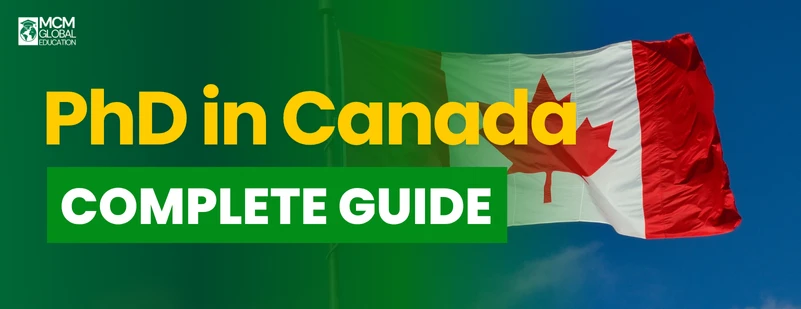If you’re planning to pursue a PhD in Canada in 2025, you’re already on the right path toward academic and research excellence. Canada is a global leader in higher education, known for its world-class universities, multicultural campuses, generous funding opportunities, and supportive immigration policies.
In this comprehensive guide, we cover everything about doing a PhD in Canada – from eligibility and application process to tuition fees, scholarships, top universities, and career prospects.
Table of Contents
Why Choose Canada for Your PhD?
1. World-Renowned Universities
Institutions like the University of Toronto and UBC are consistently ranked among the top 50 globally.
2. Affordable Tuition
Lower than the US and UK, with many funding options available.
3. PR Pathways
International PhD graduates are eligible for Permanent Residency via Express Entry.
4. Multicultural Environment
Inclusive and diverse academic culture.
5. Cutting-Edge Research
Strong research ecosystem with access to innovation hubs and grants.
Types of PhD Programs in Canada
- Full-time PhD – Traditional 3 to 6-year programs.
- Part-time PhD – Flexible option for working professionals.
- Integrated PhD – Direct entry after a bachelor’s degree.
- Joint/Collaborative PhD – Between Canadian and international institutions.
Top Universities for PhD in Canada (2025)
| University | QS World Rank (2025) | Strong Fields |
|---|---|---|
| University of Toronto | #21 | AI, Medicine, Engineering |
| University of British Columbia | #34 | Environmental Science, Physics |
| McGill University | #29 | Public Health, Business |
| University of Alberta | #93 | Energy, Engineering, Agriculture |
| Université de Montréal | #141 | Neuroscience, Law, Humanities |
In-Demand PhD Specializations (2025 & Beyond)
- Artificial Intelligence & Data Science
- Environmental & Climate Sciences
- Public Health & Epidemiology
- Business Management & Economics
- Biotechnology & Life Sciences
- Educational Policy & Social Work
Eligibility Criteria for PhD in Canada
| Requirement | Details |
|---|---|
| Academic Qualification | Master’s degree (or exceptional UG record for direct-entry) |
| GPA Requirement | Minimum 3.0 on a 4.0 scale |
| Language Proficiency | IELTS 6.5–7.0 / TOEFL iBT 90+ |
| Research Proposal | Compulsory for most programs |
| Supervisor Approval | Pre-approval required by many universities |
Step-by-Step Application Process
- Choose your field & university
- Identify and contact potential supervisors
- Draft a strong research proposal
- Gather all academic documents
- Apply via the university portal
- Attend an interview (if required)
Documents Required
| Document | Mandatory |
|---|---|
| Transcripts | Yes |
| Statement of Purpose (SOP) | Yes |
| Letters of Recommendation (2-3) | Yes |
| Research Proposal | Yes |
| Resume/CV | Yes |
| English/French Test Scores | Yes |
| Passport & Proof of Funds | Yes |
PhD in Canada: Cost Breakdown (2025)
| Expense Type | Estimated Cost (CAD/year) |
|---|---|
| Tuition Fees | $7,000 – $18,000 |
| Accommodation | $6,000 – $12,000 |
| Food & Transportation | $3,000 – $6,000 |
| Books & Supplies | $1,000 – $2,000 |
| Health Insurance | $600 – $900 |
Total Yearly Cost: ~CAD 18,000 – 35,000
Scholarships & Funding for PhD in Canada
| Scholarship Name | Value | Eligibility |
|---|---|---|
| Vanier Canada Graduate Scholarship | $50,000/year for 3 years | International students in doctoral studies |
| Ontario Trillium Scholarship | $40,000/year | PhD students in Ontario |
| Banting Postdoctoral Fellowships | $70,000/year | Postdoctoral applicants |
| NSERC/SSHRC/CIHR Grants | Varies | Based on field of study |
| University TA/RA Positions | $12,000–$20,000/year | Available across most universities |
Work Opportunities During & After PhD
| Period | Work Opportunity |
| During Studies | 20 hrs/week off-campus + TA/RA |
| Post-PhD | Up to 3-year PGWP (Post-Graduation Work Permit) |
| Immigration | Express Entry, PNP, Quebec Experience Program |
Visa Process for PhD Students
Key Steps:
- Get your Letter of Acceptance
- Apply for a Canadian Study Permit
- Submit biometrics & medical
- Show proof of funds (CAD $20,000+ recommended)
- Receive permit and prepare for departure
You can also bring your spouse and children on a dependent visa.
Career Scope After PhD in Canada
| Career Path | Average Salary (CAD) |
|---|---|
| Assistant Professor | $80,000 – $120,000 |
| Research Scientist | $75,000 – $110,000 |
| Policy Analyst | $65,000 – $95,000 |
| Data Scientist | $90,000 – $130,000 |
| Postdoc Research Fellow | $45,000 – $65,000 |
Common Challenges + Expert Tips
| Challenge | Tip |
|---|---|
| Supervisor mismatch | Contact multiple supervisors & interview them |
| Financial stress | Apply for multiple funding sources early |
| Research burnout | Use university mental health & peer support resources |
| Cultural adjustment | Join student communities, multicultural events |
Frequently Asked Questions (FAQs)
Q1. Can I do a PhD in Canada without IELTS?
Yes, if your previous education was in English or if the university accepts other tests like TOEFL or Duolingo.
Q2. How long does a PhD take in Canada?
Typically 3–6 years depending on program and research topic.
Q3. Is PhD in Canada fully funded?
Many programs are fully funded via scholarships, TA/RA roles, and government support.
Q4. Can I get PR after my PhD in Canada?
Yes. You’re eligible for Express Entry or Provincial Nominee Programs (PNPs).
Final Thoughts
A PhD in Canada is not just an academic pursuit—it’s an investment in your global future. With its excellent research infrastructure, supportive policies, and career growth opportunities, Canada remains one of the best destinations for doctoral studies.























